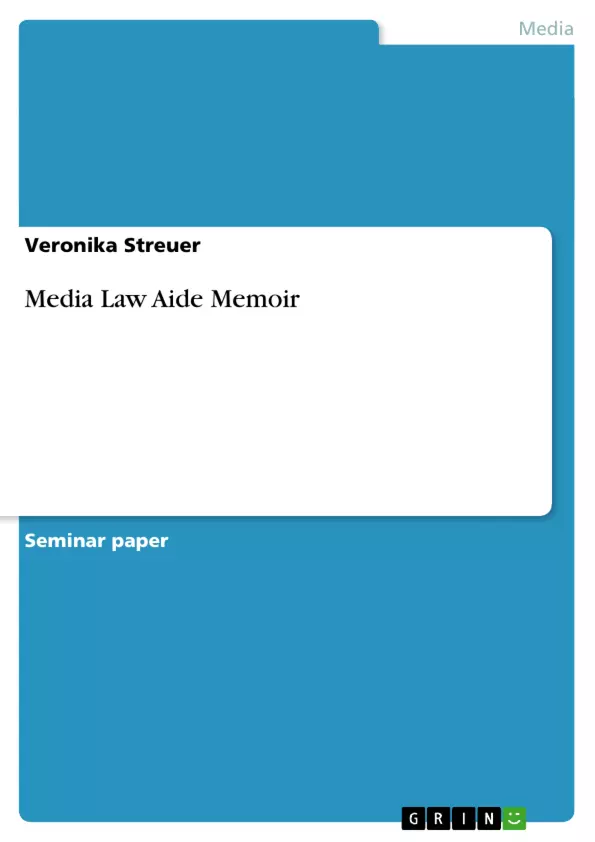This media law aide-memoir gives a guideline on how to act according to the law and it is supposed to help to prevent mistakes. You might not be aware of it, but especially in the case of reporting from the courts or reporting about ‘very important persons’, chances are high that mistakes could lead to unwanted outcomes, e.g. harm or risk to a person or high fines and/or imprisonment for the reporting person. Therefore you should be familiar with the law and maybe also have some thoughts about ethics, before starting to report.
Inhaltsverzeichnis (Table of Contents)
- Introduction to the media law aide-memoir
- Reporting from the courts
- Activeness of a case
- Access to the courts and basic guidelines
- Magistrates courts
- Crown courts
- The Contempt of Court Act
- Special notes
- Youth courts
- Sex offences
- Libel
- What is libel?
- What to ask yourself before risking to be sued for libel
- Who can sue and what does the person have to prove?
- Ways of defence
- Justification
- Fair comment
- Privilege
- Privacy and the Human Rights Act
- The Human Rights Act
- Privacy
Zielsetzung und Themenschwerpunkte (Objectives and Key Themes)
This media law aide-memoir aims to provide a guide on how to report from courts and other sensitive situations in compliance with the law. It is intended to help prevent mistakes and understand the potential consequences of legal violations. This work emphasizes the need for awareness of legal frameworks and ethical considerations in media reporting.- Reporting from the courts: Guidelines on reporting from courts, including restrictions and reporting restrictions
- Contempt of Court Act: Explanation of the Contempt of Court Act and its implications for media reporting
- Libel: Defining libel, identifying potential risks, and outlining defenses against libel suits
- Privacy and the Human Rights Act: Discussing the Human Rights Act and its implications for privacy considerations in media reporting
Zusammenfassung der Kapitel (Chapter Summaries)
- Introduction to the media law aide-memoir: This chapter introduces the purpose and importance of the media law aide-memoir, emphasizing the potential consequences of legal violations in media reporting. It underlines the importance of understanding the law and ethics.
- Reporting from the courts: This chapter provides an overview of key legal considerations when reporting from courts. It covers topics such as determining the activeness of a case, accessing court records, and restrictions on reporting certain types of cases. It also discusses the need for fair and accurate reporting.
- Activeness of a case: This section explains the factors that determine the activeness of a case, including arrest, warrants, and charges. It highlights the importance of avoiding bias and prejudice in reporting.
- Access to the courts and basic guidelines: This section covers rules regarding access to courts for media reporting, including restrictions on recording devices and photography. It emphasizes the right to fair and accurate reporting.
- Magistrates courts: This section details the different types of offences handled by magistrates courts, highlighting the specific reporting restrictions that apply to preliminary hearings of indictable offenses.
- Crown courts: This section explains the principles of open justice and the role of media reporting in crown court proceedings. It discusses reporting restrictions that apply to cases involving vulnerable witnesses and applications for dismissal.
- The Contempt of Court Act: This section introduces the Contempt of Court Act 1981 and its purpose in preventing contempt of court. It specifically addresses sections 4 and 11 of the Act, explaining temporary and permanent reporting restrictions.
- Special notes: This section provides additional guidelines for reporting from youth courts and sex offence proceedings, highlighting the importance of protecting the identity of minors and victims.
Schlüsselwörter (Keywords)
The key topics and concepts explored in this work include media law, reporting restrictions, contempt of court, libel, privacy, Human Rights Act, youth courts, sex offences, and ethical considerations in media reporting. These themes provide a framework for understanding the legal and ethical complexities involved in reporting from courts and other sensitive situations.Frequently Asked Questions
What is the Contempt of Court Act?
The Contempt of Court Act 1981 is designed to prevent media reporting that creates a substantial risk of serious prejudice to active legal proceedings, ensuring a fair trial.
When is a court case considered 'active'?
A case becomes active once a person is arrested, a warrant is issued, or a summons or charge is served. Reporting restrictions apply as soon as the case is active.
What is libel in media law?
Libel is a published false statement that is damaging to a person's reputation. Journalists can be sued if they publish defamatory material that they cannot prove to be true or fair.
How can a journalist defend themselves against a libel suit?
Common defenses include Justification (proving the statement is true), Fair Comment (honest opinion on a matter of public interest), and Privilege (reporting on official proceedings).
Are there special rules for reporting on youth courts?
Yes, there are strict reporting restrictions to protect the identity of minors involved in court proceedings, including their name, address, and school.
- Citar trabajo
- B.A. Veronika Streuer (Autor), 2009, Media Law Aide Memoir, Múnich, GRIN Verlag, https://www.grin.com/document/128722



